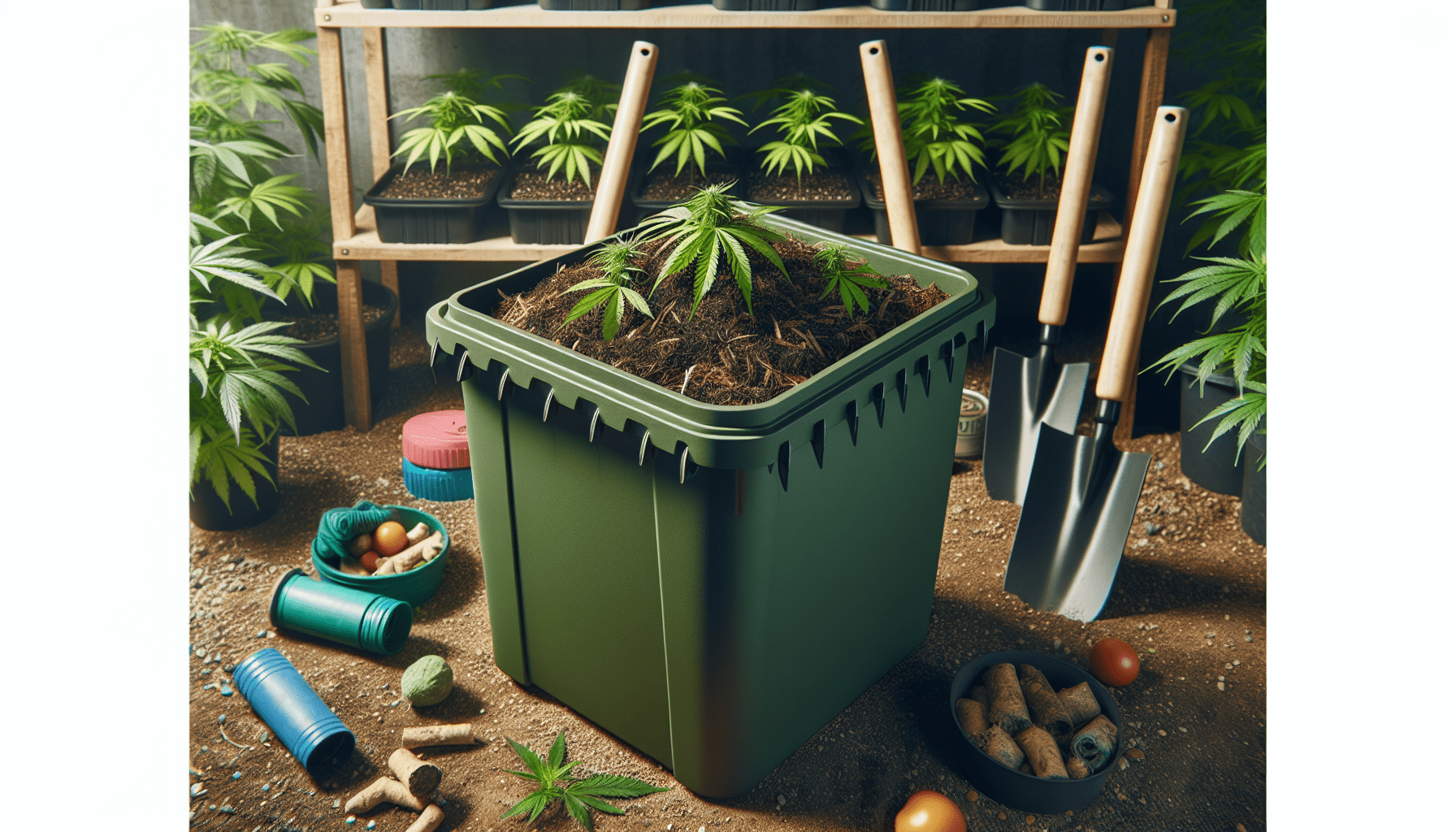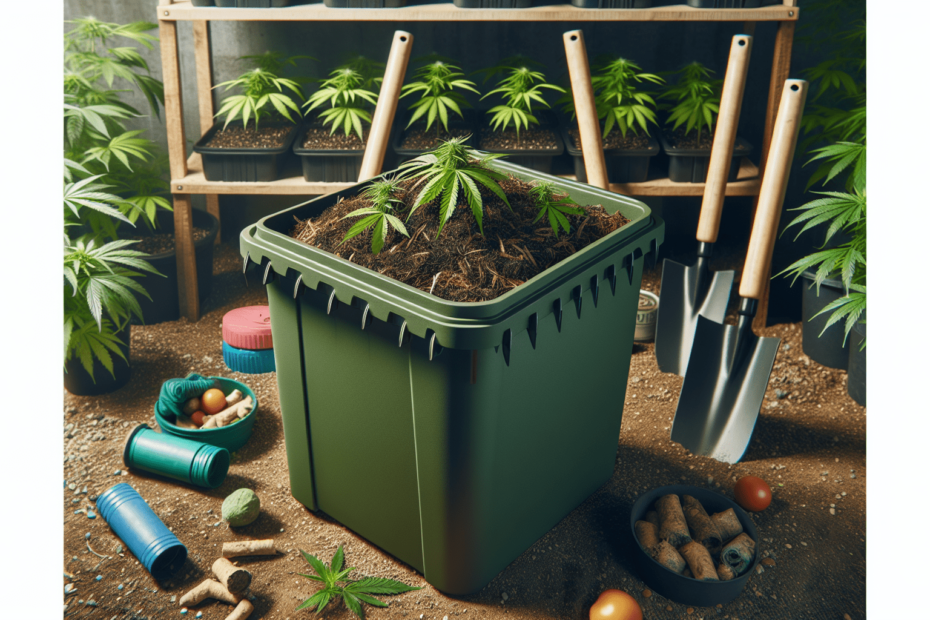How To Handle Waste Management In Cannabis Cultivation?
If you’re a cannabis cultivator, waste management is a crucial aspect of your operation. Knowing how to properly handle and dispose of waste is not only essential for compliance with regulations but also for environmental sustainability. In this article, we’ll discuss various waste management strategies and best practices for cannabis cultivation.

Understanding Cannabis Waste
First things first, let’s talk about the different types of waste that are generated during cannabis cultivation. From plant material to packaging, there are several categories of waste that you need to be mindful of. Here’s a breakdown:
- Plant Material: This includes stems, leaves, roots, and other parts of the cannabis plant that are not used for consumption.
- Packaging: Cannabis products come in a variety of packaging materials, such as plastic containers, glass jars, and cardboard boxes.
- Chemicals and Pesticides: Used chemicals, pesticides, and other substances that are no longer needed.
- Water and Nutrient Waste: Excess water and nutrients used during the cultivation process.
Understanding the different types of waste is the first step in developing an effective waste management plan for your cannabis cultivation operation.
Implementing a Waste Management Plan
Now that you know the various types of waste generated during cannabis cultivation, it’s time to develop a waste management plan. This plan should outline how you will handle, store, and dispose of waste in a safe and environmentally friendly manner. Here are some key steps to consider when implementing a waste management plan:
- Identification: Identify the different types of waste generated in your cultivation operation.
- Segregation: Separate waste into different categories to facilitate proper disposal and recycling.
- Storage: Store waste in designated containers or areas to prevent contamination and ensure safety.
- Disposal: Dispose of waste according to local regulations and guidelines.
By taking these steps, you can ensure that your cannabis cultivation operation is in compliance with waste management regulations and is doing its part to protect the environment.
Composting Plant Material
One sustainable way to manage plant material waste in cannabis cultivation is through composting. Composting involves breaking down organic materials into nutrient-rich soil that can be used to fertilize plants. Here’s how you can set up a composting system for your cannabis cultivation operation:
- Designate a Compost Area: Choose a location on your property where you can set up a compost pile or bin.
- Collect Plant Material: Gather plant material such as stems, leaves, and roots that are suitable for composting.
- Layer Materials: Alternate layers of green (nitrogen-rich) and brown (carbon-rich) materials to promote decomposition.
- Aerate and Water: Regularly turn the compost pile to provide oxygen and moisture for the decomposition process.
- Use Compost: Once the materials have broken down into compost, use it to fertilize your plants.
Composting is a cost-effective and sustainable way to manage plant material waste and improve the overall health of your cannabis cultivation operation.
Recycling Packaging Materials
In cannabis cultivation, packaging materials are a significant source of waste that can be recycled to minimize environmental impact. Here are some tips for recycling packaging materials in your operation:
- Plastic Containers: Rinse out plastic containers used for storing cannabis products and recycle them according to local guidelines.
- Glass Jars: Clean glass jars used for packaging cannabis flower or concentrates can be reused or recycled.
- Cardboard Boxes: Flatten cardboard boxes used for shipping or storing cannabis products and recycle them with other paper products.
By incorporating recycling practices into your waste management plan, you can reduce the amount of waste sent to landfills and contribute to a more sustainable cannabis cultivation industry.

Proper Disposal of Chemicals and Pesticides
Chemicals and pesticides used in cannabis cultivation must be disposed of properly to prevent environmental contamination and ensure the safety of workers and consumers. Here are some guidelines for the safe disposal of chemicals and pesticides:
- Follow Label Instructions: Read and follow the label instructions on chemical and pesticide products for disposal guidelines.
- Contact Local Authorities: Contact local waste management authorities to inquire about hazardous waste disposal programs in your area.
- Secure Storage: Store chemicals and pesticides in a designated area that is secure and prevents leaks or spills.
- Use Professional Services: Consider hiring a waste management company that specializes in hazardous waste disposal for chemicals and pesticides.
By following these guidelines, you can ensure that chemicals and pesticides are disposed of safely and responsibly, minimizing the impact on the environment and public health.
Managing Water and Nutrient Waste
Water and nutrient waste are common byproducts of cannabis cultivation that can have a significant impact on the environment if not managed properly. Here are some strategies for managing water and nutrient waste in your cultivation operation:
- Recirculating Systems: Implement recirculating systems that capture and reuse water and nutrients to minimize waste.
- Monitoring and Adjusting Nutrient Levels: Regularly monitor nutrient levels in irrigation water and adjust accordingly to prevent overuse and waste.
- Water Conservation Practices: Implement water conservation practices such as drip irrigation and mulching to reduce water waste.
- Safe Disposal: Dispose of excess water and nutrient solutions in a responsible manner to prevent contamination of soil and water sources.
By implementing these strategies, you can reduce water and nutrient waste in your cannabis cultivation operation and promote environmental sustainability.

Compliance with Waste Management Regulations
Compliance with waste management regulations is essential for cannabis cultivators to avoid legal penalties and maintain a positive reputation in the industry. Here are some key regulations to keep in mind:
- Local Regulations: Familiarize yourself with local waste management regulations specific to cannabis cultivation in your area.
- Reporting Requirements: Be aware of reporting requirements for waste management activities, such as tracking waste generation and disposal.
- Documentation: Keep detailed records of waste management activities, including storage, disposal, and recycling efforts.
- Training and Education: Provide training for staff on proper waste management practices and compliance with regulations.
By staying informed and proactive about waste management regulations, you can ensure that your cannabis cultivation operation operates in a responsible and compliant manner.
Conclusion
Waste management is a critical aspect of cannabis cultivation that requires careful planning and implementation. By understanding the different types of waste generated, developing a waste management plan, and using sustainable practices such as composting and recycling, you can minimize the environmental impact of your operation and ensure compliance with regulations. Remember, waste management is not just a legal requirement – it’s a responsibility to the environment and future generations. Take the time to evaluate and improve your waste management practices to create a more sustainable and eco-friendly cannabis cultivation operation.

